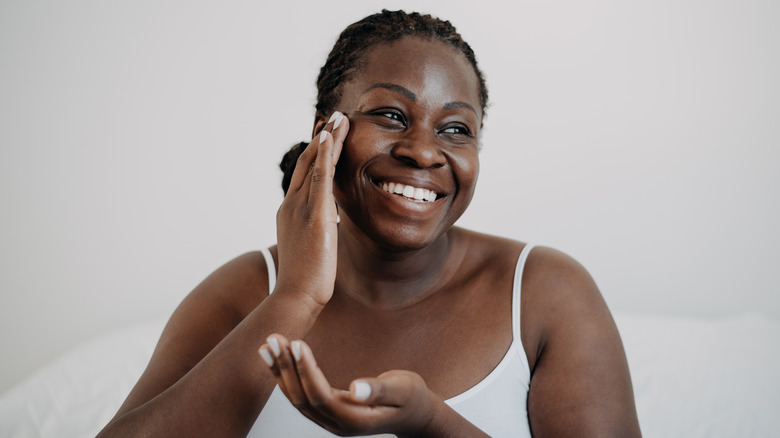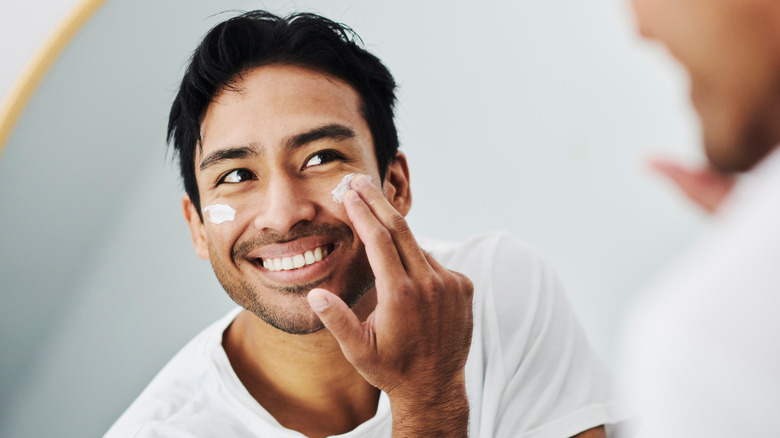Do Tinted Sunscreens Provide Enough Coverage For Your Skin?
Summer sunshine can feel like a warm embrace. It trickles through windows in the morning, sails sky high in the afternoon, luminates everything, and provides immaculate colors in the evening. It's almost strange to think something so beautiful can cause harm to our skin, yet that's the reality that we live in. This is where sunscreen comes in to save the day.
Sunscreen is an important part of skincare, especially in the summer when the sun's rays are the strongest. Adding it to your skincare routine, or finding products that contain sunscreen already, can do wonders from your skin. Sunscreen protects your skin from UV rays and helps prevent wrinkles, premature aging skin, and hyperpigmentation. Figuring out the strongest and best kinds to use, however, can be an obstacle. Tinted sunscreens are definitely a popular choice, especially if you're worried about the noticeable ashy tone that standard sunscreen can sometimes cause. But the biggest question regarding tinted sunscreens is, are just as effective as the un-tinted version?
The difference between tinted and un-tinted sunscreen
Tinted sunscreen is mineral-based sunscreen that has pigments in its ingredients, and the pigments help match your skin tone. Un-tinted sunscreens, on the other hand, can also be mineral-based, but they do not contain the pigments to offset the white cast.
Many makeup and skincare products nowadays brag about the sunscreen they contain, which is typically un-tinted. As for makeup, while convenient, some wonder if it's just as effective as regular sunscreen. When it comes to the efficacy of tinted sunscreen, the answer is yes it's as protective, and not just yes, but rather they may be even better than un-tinted sunscreen. "If you have a sunscreen that says it's all these other things, it's still your sunscreen. Those other ingredients are in there to support the sunscreen," New York-based dermatologist Dr. Doris Day, M.D., told Refinery29. Day went on to explain that some makeup and skincare products may contain a 50 SPF, but because of the other ingredients, it may be brought down to an SPF 40. However, that doesn't change the fact that it's sunscreen.
For those that use tinted sunscreen, this is good news. Tinted sunscreen even protects against blue light in addition to UV rays, unlike un-tinted sunscreen, making it a great choice for those looking for extra protection.
Sunscreen and protection for all
Sunscreen is important to use year-round, not just in the summer. If you're spending time outside or in water or snow, you should apply even more sunscreen. It's also important to regularly apply if your skincare routine includes certain ingredients. "With many people using active skincare ingredients, such as retinoids and exfoliating acids to keep skin healthy and youthful looking, skin tends to be more sensitive, making daily sunscreen application a must," board-certified dermatologist and medical advisor for docent, Farhaad Riyaz, M.D., told Healthline.
The American Academy of Dermatology suggests using sunscreen with an SPF of at least 30, therefore, tinted sunscreens that are dermatologist approved will have a higher SPF. SPF, which stands for sun protection factor, measures how effective the sunscreen is in regards to protecting you from the sun's UV rays. Its purpose is to approximate how long it would take before the sun starts to redden your skin, meaning it takes much longer for your skin to redden when an SPF sunscreen is applied to the skin. Skin may not redden as easily for those with darker skin, however, sunscreen still helps prevent skin damage and skin cancer, making it important to apply no matter your skin tone. "It's important not to rely on high-SPF sunscreens alone," New Jersey-based director of dermatologic surgery and dermatology at Memorial Sloan Kettering Cancer Center, Steven Wang, M.D., told the Skin Cancer Foundation. "No single method of sun defense can protect you perfectly."


